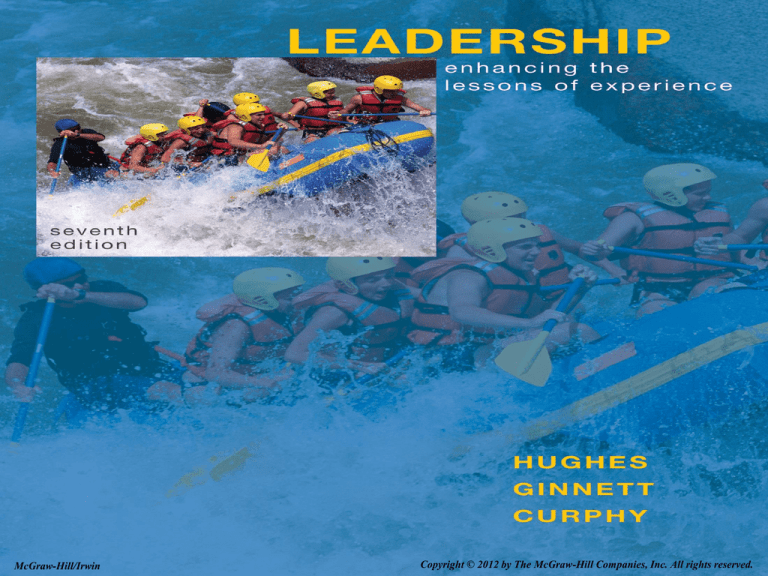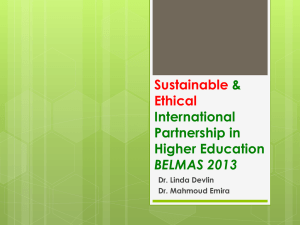
McGraw-Hill/Irwin
5-1
Copyright © 2012 by The McGraw-Hill Companies, Inc. All rights reserved.
Chapter
5
Leadership Ethics and Values
“Leadership cannot just go along to get
along… Leadership must meet the moral
challenge of the day.”
~Jesse Jackson
5-2
Introduction
• Personal values may be one of the most
important determinants of how power is
exercised or constrained.
• Mere possession of power leads to
ethical questions about usage of power.
• The challenge of leadership becomes
complex in a diverse and global
environment.
5-3
Leadership and “Doing the Right
Things”
• Leaders face dilemmas that require choices
between competing sets of values and
priorities.
• Leaders set a moral example that becomes the
model for an entire group or organization.
• Leaders should internalize a strong set of
ethics, principles of right conduct, or a system
of moral values.
• Good leaders tend to align the values of their
followers with those of the organization or
movement.
5-4
Leadership and “Doing the Right
Things” (continued)
• Four qualities of leadership that engenders
trust:
–
–
–
–
Vision
Empathy
Consistency
Integrity
• Two contrasting sets of assumptions people
make about human nature:
– Theory X
• Reflects that most people need extrinsic
motivation.
– Theory Y
• Reflects that most people are intrinsically
motivated.
5-5
What Are Values?
• Values: “Constructs representing
generalized behaviors or states of affairs
that are considered by the individual to be
important.”
• They play a fairly central role in one’s
overall psychological makeup.
– They can affect behavior in a variety of
situations.
• Individuals in the same work unit can have
considerably different values.
• We can only make inferences about
people’s values based on their behavior.
5-6
Are there Generational
Differences in Values?
• Pervasive influences of broad forces at a
particular time tend to create common value
systems.
– This may contribute to misunderstandings and
tension between older leaders and younger
followers.
• Each generation is molded by distinctive
experiences at their critical developmental
periods:
–
–
–
–
The Veterans (1922–1943)
The Baby Boomers (1942–1960)
The Gen Xers (1960–1980)
The Nexters (1980–)
5-7
Are there Generational
Differences in Values? (continued)
• Research has also found that there is
little evidence of a generation gap in
basic values.
• Research has looked at how GenXers
impact leadership:
– Define leadership as removing obstacles and
gioving followers what they need
– Believe leaders have to “earn their stripes”
rather than advance by seniority
5-8
Moral Reasoning
• An important consideration is how one thinks
about value-laden issues or ethical dilemmas.
• Moral reasoning: Process leaders use to make
decisions about ethical and unethical behaviors.
– Manner by which leaders solve moral problems.
• Value differences often result in different
judgments regarding ethical and unethical
behavior.
• Kohlberg offers that although the development
of moral reasoning is invariant, not all
individuals actually achieve the highest stages.
5-9
Developmental Levels and Stages of
Moral Reasoning
5-10
Biases Affecting Moral Decisions
Research has identified 4 biases that affect our
moral decision making:
• Implicit prejudice – subconscious prejudices
that affect our decisions without us being
aware of them
• In-group favoritism – doing acts of kindness
and favors for those who are like us
• Overclaiming credit – overrating the quality of
our own work and contributions
• Conflicts of interest – we often discount the
effects of a conflict of interest
5-11
Examples of Rushworth Kidder’s
Four Ethical Dilemmas
• Truth versus loyalty – when honestly answering
a question may compromise confidentiality.
• Individual versus community – compromising
the rights of an individual for the good of the
community.
• Short-term versus long-term – balancing time
with children verses on career.
• Justice versus mercy – for ex excusing a
person’s behavior due to extenuating
circumstances
5-12
Kidder’s Principles for Resolving
Ethical Dilemmas
• Ends-based thinking – “Do what’s best for the
greatest number of people.” Also known as
utilitarianism.
• Rule-based thinking – “Following the highest
principle or duty.”
• Care-based thinking – “Do what you want
others to do to you.” Also known as The Golden
Rule.
5-13
Ways people avoid feeling guilty
Good people sometimes do bad things. Here are
some ways people avoid guilty feelings
associated with those actions:
•
Moral justification
•
Euphemistic labeling
•
Advantageous comparison
•
Displacement of diffusion of responsibility
•
Disregard or distortion of consequences
•
Dehumanization
•
Attribution of blame
5-14
Authentic Leadership
• Founded in Greek philosophical notion of “to
thine own self be true.”
• Strong ethical convictions that guide behavior
• Not so much avoiding doing what is “wrong” as
much as trying to do what is “right”
• Has gained momentum recently because
• of beliefs that
– enhancing self-awareness can help people in
organizations find more meaning and connection at
work
– Promoting transparency and openness in relationships
builds trust and commitment
– fostering more inclusive structures and practices can
help build more positive ethical climates
5-15
Servant Leadership
• Leadership role is serving others
• Stems in part from the teachings of Jesus
• 10 characteristics describe servant leaders:
•
•
•
•
•
•
•
•
•
•
Listening
Empathy
Healing
Awareness
Persuasion
Conceptualization
Foresight:
Stewardship
Commitment to others’ growth
Building community:
5-16
Leading by example…
• One of the most quoted “principles of good
leadership”
• Research shows that ethical role models are
characterized by four general categories of
attitudes and behaviors:
–
Interpersonal behaviors : show care, concern, and compassion for
others.
–
Basic fairness : fairness shown to others
–
Ethical actions and self-expectations: hold themselves to high ethical
standards
–
Articulating ethical standards: articulate a consistent ethical vision and
are uncompromising toward it
5-17
Formal Leadership Roles
Formal leadership roles impose unique ethical
responsibilities and challenges.
Leaders more than followers:
•
Possess unique degrees of both legitimate and
coercive power
•
Enjoy greater privileges
•
Have access to more information
•
Have greater authority and responsibility
•
Interact with a broader range of stakeholders who
expect equitable treatment
•
Must balance sometimes competing loyalties when
making decisions
5-18
Creating and sustaining an ethical
climate
5 “fronts” of leadership action are required to create an
ethical climate:
• Formal ethics policies and procedures – formal statements
of ethical standards and policies, reporting mechanisms,
disciplinary procedures, penalties for ethical violations
• Core ideology – organization’s purpose, guiding principles,
basic identity, and most important values have to have an
ethical focus
• Integrity – can’t be just plaques, posters or declarations…
ethics has to be enacted through personal integrity
• Structural reinforcement – organization’s structure and
systems should encourage higher ethical performance and
discourage unethical performance
• Process focus – how goals are achieved is as important as
achievement
5-19
Principle–centered Leadership
Fundamental interdependence between the personal,
interpersonal, managerial, and organizational levels of
leadership
Unique roles of each are:
• Personal – be a trustworthy person in terms of both
character and competence.
• Interpersonal – a lack of trust leads to self-protective efforts
to control and verify each other’s behavior.
• Managerial – empowering others requires a trusting
relationship and requires team building, delegation,
communication, negotiation, and self-management.
• Organizational – creativity requires the organization’s
structure, systems (e.g. training, communication, reward),
strategy, and vision be aligned and mutually supportive.
5-20
Summary
• There is a relationship between ethics, values and
leadership
• More than just the content of what one believes is
right and wrong, how one makes ethical decisions
is critical.
• Ethical dilemmas often involve a choice between
two “rights” rather than right and wrong.
• Recent research has explored the
interdependencies between effective leadership
and particular value systems
5-21










